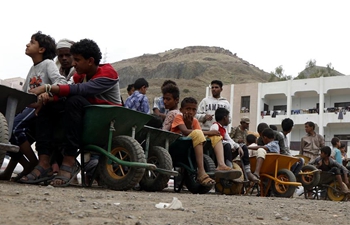TOKYO, Sept. 11 (Xinhua) -- The number of cases of rubella infections in Japan this year has spiked to 362, almost four times higher than a year earlier with more than 70 percent of the cases located in Tokyo and its surrounding prefectures, the National Institute of Infectious Diseases (NIID) said Tuesday.
According to the institute, the possible rubella epidemic has been increasing since late July, and, across Japan, medical institutions have been reporting increasing numbers of new cases, with 75 reported before early September, bringing the total to 362.
This marks the biggest outbreak since 2013, the institute said, when there was a major outbreak in Japan with more than 10,000 people being infected.
According to the institute's latest report, by region, 28 new cases were reported in Tokyo, 11 new cases in neighboring Chiba Prefecture, eight in nearby Kanagawa Prefecture, seven in Aichi Prefecture in central Japan and five cases in Ibaraki and Saitama prefectures, which are also close to Tokyo.
In light of this, the institute has voiced its concerns that the outbreak of rubella, also known as German measles, could affect the Tokyo Olympic and Paralympic Games in Japan in 2020.
The institute, in light of this, is urging people, particularly men in their 30s to 50s, to get vaccinated.
So far, the institute said, vaccinations of this demographic have been insufficient, most likely because these men did not have adequate vaccination shots when they were children, or were not vaccinated at all.
The cause of rubella is a highly contagious virus that can be passed from person to person when an infected person coughs or sneezes, or it can spread by direct contact with an infected person's respiratory secretions, such as mucus.
It can also be transmitted from pregnant women to their unborn children via the bloodstream.
There can be serious health implications if the disease is contracted by women in the early stages of pregnancy as it can cause serious birth defects such as heart disorders, hearing impairments, cataracts, growth retardation and intellectual disabilities in babies.
The highest risk to the fetus is during the first trimester, but exposure later in pregnancy is also dangerous, according to experts on the matter.
The institute says that women who may become pregnant should receive a vaccination followed by a booster shot, with the vaccination alone likely being effective in preventing the disease.
Women who are already pregnant, however, cannot be vaccinated because the vaccine itself could harm the baby.
The institute is also calling on family members and others close to pregnant women to receive vaccinations if they have never had the disease or do not have records of having received the requisite vaccinations when they were children.











